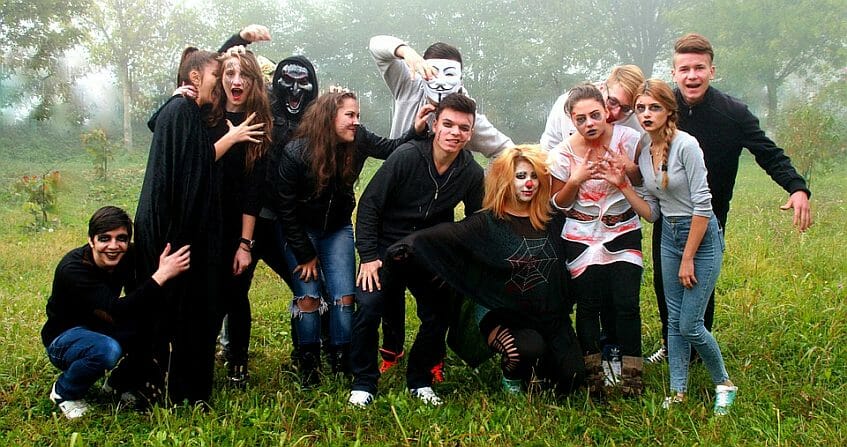
As parents, we put all our heart and energy into raising our children to be the best they can be. We want them to be as healthy, friendly, successful and happy as possible. In their teen years, we fear that their friends will become the most important people in their life. So we want to make sure those friends do not have bad influence over them.
Our investment in our children, both material and emotional, is tested several times during their life. Their social connections are one big test of parenting, because as parents, we try to pass our philosophy and values to our children. If they spend their time with friends who tell them the opposite, this may weaken their belief in our philosophy and our values.
To be or not to be … cool
Teens are more vulnerable to outside influence, because they are preparing for separation from their parents by developing independent thinking. During this period, they bounce between following their family rules and values and following their “crowd”. Pleasing parents is much less attractive to teenagers than being “cool”.
There can be different reasons for parents to worry about “bad influence”. All of them start from friendships that challenge family values. Once teenagers question something that is important for the family, their parents feel threatened.

Some examples are food habits, manners, joint family interests, language conventions, attitude towards money, attitude towards extended family, religious beliefs, technology consumption (sigh), cultural values, health and future goals. Imagine how you would feel if your teenager started eating junk, swearing like a sailor, chatting until 2am and starting to lose (or put on) weight, apparently to keep up with their friends.
The test of peer pressure
After working very hard for many years to establish good rules, a stable routine and a position direction, most parents find it hard to face the test of peer pressure. The reason this test is hard stems from parents’ belief that their influence weakens as soon as their children become teenagers.
In fact, research shows the opposite. The influence of parents and the home environment is more critical to people’s development than any bad influence of their peers. When asked who had the biggest impact on their beliefs and attitude, most people rank their parents in the first place.
The challenge parents face during those teen years is a test of patience and confidence. If you pass it, you get to keep First Place. If you fail , you have to share the “crown” with others.
It is important to understand that even if you lose the battle on food, computer habits or studying dreams, you can still win the war and keep the “most influential” title. These tests are not easy, not for teens and not for their parents, but they can help the parents prove their point(s) and help the teens gain trust and confidence in their parents’ direction.

We need to welcome the challenges of adolescence, use them to strengthen our philosophy and project more confidence in our way of life. This confidence is crucial to our teens’ development, independence and future success.
Testing boundaries at home is a good thing
It is important to remember that it is better for your teens to test the boundaries when they are home than to test them when they are away from home. When they are on their own, without your guidance and help, and they fail, it is harder for them to get up.
When they question your philosophy during their teens, because of the “bad influence” of their friends, and they know that you are there to support them even if they fail, you pass the test of trust and you stay important and influential. This way, you get much closer to keeping them healthy, happy, friendly and successful.
Stay away from competition
There are many types of bad influence and all of them question the power of parents. Creating a competition where teens must choose between their friends and their parents shows weakness and fails the test of parenting. Parents need to avoid this competition at all costs and encourage social interactions that are beneficial to their teens.
Competition will push the teens to find refuge in their friends from their “controlling parents”. By accepting their social choices, we enable our teens to focus on finding better friends on their own. This may take time, but the result is much better for everyone.
Substitution is better than elimination

When developing healthy eating habits, it helps to substitute “bad” foods with “good” ones. Simply eliminating a type of food altogether creates a feeling of loss. In the same way, it is better to suggest alternative friends than to try to eliminate existing ones.
Encourage your teens to be with friends you prefer and do not talk badly about those you do not like. The best way for your teens to change their social group from one that is not good for them to one that matches your family values is to identify social groups with the same values parents have and encourage teens to take part in their activities.
At my son’s high school, the teens who played musical instruments seemed to be the smarter students. On academic awards nights, over 85% of the students who received awards played music, sang or both. We encouraged our son strongly to take part in any social gathering with those teens and to invite them over, which supported our philosophy that academic success is important and that it is better to hang around children with high academic achievements than with teens who think you are a nerd if you get an A on your exam.
Self-awareness is key
From time to time, it is a good idea to help teens, preferably early on, to evaluate their friendships and come up with their own perspective on whether the interactions with friends support them in achieving their goals in life or prevent them from doing so. It is tempting to tell our teens our own perspective, but it is very important not to do it.

Use personal examples to share your insights into friendships that were not good for you and how you took control over your friendships. Use genuine questions (not leading questions or sarcastic questions) to help your kids determine who they want to be and who they need to spend time with in order to achieve that. If they want to be athletes and their health is important to them (to them, not to you), it is better not to hang around those who chat on Facebook until 4am or with those who smoke or drink alcohol. Never say it. Help your teens discover these things by themselves.
It is essential to make this self-evaluation, with focus on the word “self”. Parents can guide, but should not push their own judgment on their teens’ friendships. When done properly, it will send a message to your teens that they have the freedom to choose their friends. Not having to do what their parents push them to do is the most “cool” they can be.
It is only natural to invest in your children and feel threatened when a friend challenges your values and has bad influence on them. Remember, you are a sales person, selling your way of life to your kids. So think of this as an opportunity to refine and strengthen your “sales pitch” on how to choose friends that support your teens on their life’s journey.
Parenting tests only mean that parents must use more sophisticated “sales” techniques to convince their teens to keep following their family values. When you “sell” it right, you will have happy “customers”.
Happy parenting,
Ronit











